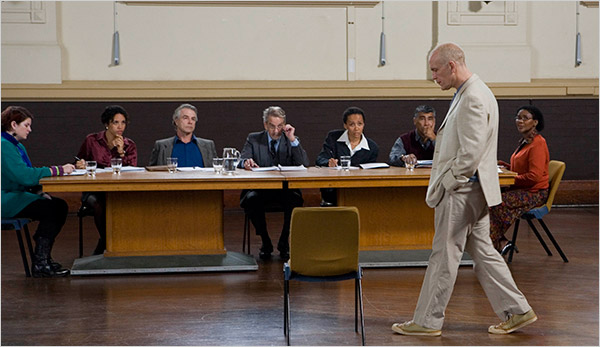|
Reviews of Recent Independent, Foreign, & Documentary Films in Theaters and DVD/Home Video

DISGRACE J. M. Coetzee is an award-winning South African novelist and a pessimistic expatriate who has resettled in Australia. Parallels between how these two countries are trying to reconcile their bitter racial histories attracted Australian filmmakers to adapt his 1999 novel. Disgrace works more convincingly as an allegory than through the individual characters, even though John Malkovich successfully pulls off the difficult task of effectively portraying a dislikable man, Professor David Lurie. The ivory tower of his Cape Town university can no longer shield him from the changes the new South Africa has wrought. Teaching romantic poetry for years, he fancies himself with Byronic powers and above the restrictions of conventional morality—he moves from assignations with young, non-white prostitutes to arrogantly selecting the year’s shy student conquest, Melanie (Antoinette Engel). She probably isn’t the first non-white girl the aging Lothario has smoothly pressured into sexual submission. So he is surprised that her non-white boyfriend and father protest, and that his department chair initiates charges against him, charges he haughtily refuses to dignify with a defense. In the novel, the politically-correct wheels of academic justice grind more slowly, so Anna-Maria Monticelli’s otherwise faithful script makes it too obvious why the snobby esthete ends up writing an opera about Lord Byron in the dusty hills of the Eastern Cape, where he also works at a veterinary clinic euthanizing dogs. He has fled for internal exile to the only person who will take him in, his estranged and very determined daughter, Lucy (Jessica Haines in a strong film debut), from a failed marriage. She supplements the income from her isolated farm by boarding dogs. Amidst the constant yapping of caged animals, Lurie begins a desultory affair with Lucy’s stolid, middle-aged, and married friend Bev (Fiona Press), a relationship that seems more motivated by penance than anything else. His later efforts at apology in Cape Town do not convince that he’s really learned anything more than a sense of powerlessness.
Lucy, in turn, is heavily dependent on her Xhosa neighbor
Petrus (Eriq Ebouaney). His ambiguous role may be kindly or a patronizing
protector or schemer. Petrus seems more wily and threatening than in the
book—his tribal connections trump Western notions of justice in dealing
with a shocking incident and its almost inexplicable aftermath. While
the film’s approach to this character treads near uncomfortable stereotypes, the
script is faithful to Coetzee’s acerbic attitude and presents
an alternative view of South Africa’s future than the usual uplifting
themes of reconciliation and forgiveness.
Nora Lee Mandel
|

